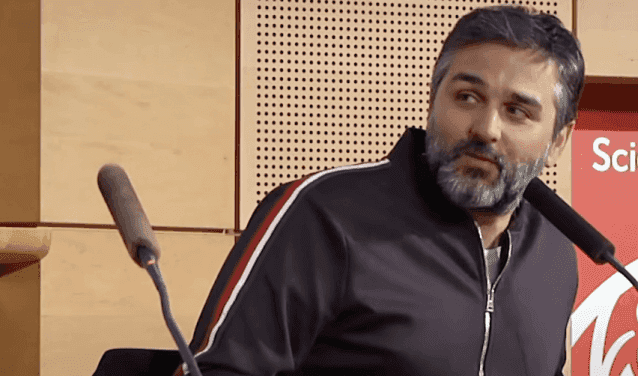Home>Olivier Nakache on Cinema and the Power of Collectivity

25.03.2022
Olivier Nakache on Cinema and the Power of Collectivity
On 17 March 2022, French director and screenwriter Olivier Nakache came to Sciences Po to discuss cinema, his path to success, creativity, and the role that poetry plays in the artistic process. Best known for The Untouchables (Les Intouchables) and Those Happy Days (Nos jours heureux), Nakache has made his career in tandem with friend and longtime creative partner Éric Toledano. The two met at summer camp as boys, where they bonded over their appreciation for French director Claude Lelouch’s films, which would eventually lead them to try their hand at producing their own films—a venture which, more than twenty-five years later, continues to allow them to grow and innovate.
In this event entitled “Popular Cinema, Uniting through Creation”, hosted by Sciences Po’s School of Management and Innovation, moderated by General Delegate of the ARP and Professor for the "Communication, Media and Creative Industries" program Mathieu Debusschère and with an introduction by art historian and president of the Fondation nationale des sciences politiques Laurence Bertrand Dorléac, creativity was at the heart of the discussion. As Laurence Bertrand Dorléac noted, "There should be no obstacle to learning to imagine, to invent, to create in all of our activities, whatever they may be.” By oscillating between ideas of the individual and the collective, of the artistic responsibility linked to being a creative in the public eye, of the elusive nature of poetry, among others, Olivier Nakache provided a glimpse of what it is to be a screenwriter and director in the 21st century.
“We value the collective”
Although Olivier Nakache’s creative partner, Éric Toledano, may not have been physically present at the event, his presence was nevertheless felt. Throughout the discussion, Olivier Nakache spoke in the first-person plural, using the term “we” to discuss the subjects at hand, evoking his friend and collaborator through his syntax itself. “We value the collective”, he noted, discussing the many hands that go into the creation of a film or series and the ways in which it enriches the creative process, “when we write, we think of the movie theatre… We think of the laughter of the audience.”
For Nakache, collective creation is the path to cinematic success. With Éric Toledano, he has written seven feature-length films, four short films, and the recent series En thérapie, released to great critical and popular acclaim. For him, working in a duo is “a tremendous opportunity” because of the greater give and take and the circulation of ideas that it provides. As he notes, “On our own, there would have 50% fewer good ideas”, yet together, they continue to generate films that toe the line between comedy and drama and that appeal to a wide range of audiences.
To Nakache, it is not only the creative advantage that collective work provides that is important, but also the connections with others that it generates on both a personal and societal level. For him, the movie theatre is a “sacred” space. “What motivates our work, is that people in movie theatres experience an emotion with others”, he said, alluding to the collective experience of viewing a film. “I will always fight for movie theatres”.
Writing as Responsibility
For Olivier Nakache, beyond the role they have in bringing people together, “films are the reflection of our society, they reflect what is happening”. The awareness of cinema as a mirror of society leads Nakache to feel, as he stated, a sense of “responsibility” towards his subject matter and the people it portrays. “We champion a film for our entire life”, he continued, noting that as a creator, it is important to be able to stand behind—and take responsibility for—one’s films.
This responsibility is inherently linked with the collective—with the knowledge that one’s film is meant to exist in the public sphere. As Nakache emphasized throughout the talk, this is a role that he does not take lightly. He alluded to an awareness of the impact that his films have on society: “We aren’t engaged in politics—even if I think that every film is a little bit political—but we do have a type of activism, a type of commitment, and our way of bringing it to the surface and delivering it to you is through cinema."
On the Intangible Role of Poetry
In Nakache’s conception, the creation of a cinematic work is born out of necessity. As he stated, “it must be absolutely essential; it has to consume you”. This necessity—one which has sparked some of the most well-known French films of the 21st century—comes from a place of creativity that cannot be theorized or mapped out. Indeed, as Nakache noted, “there is no recipe”. To him, within the creative process, facing one’s fears is useful and can be a source of inspiration. “Audacity pays off, risk pays off”, he noted, saying that it is this uncharted territory that creates the magic of cinema. To him, this is where poetry begins: “There is something that eludes our grasp. Poetry always wins out in the end, it conquers all.”
Ultimately, Olivier Nakache’s technique for creating great cinema involves leaning into uncertainty, embracing the elements of randomness and chance that arise during the creative process, and allowing one’s fears to fuel meticulous attention to one’s subject matter. Although he has already constructed a rich and varied career with Éric Toledano, Nakache shows no signs of slowing down. As he noted during his conclusion, “I crave cinema. As long as I have this possibility of expressing myself through film, I’ll do it.”
The Sciences Po Editorial Team
Find out more
- Discover Sciences Po’s School of Management and Innovation
- Check out the recording of the event (FR)